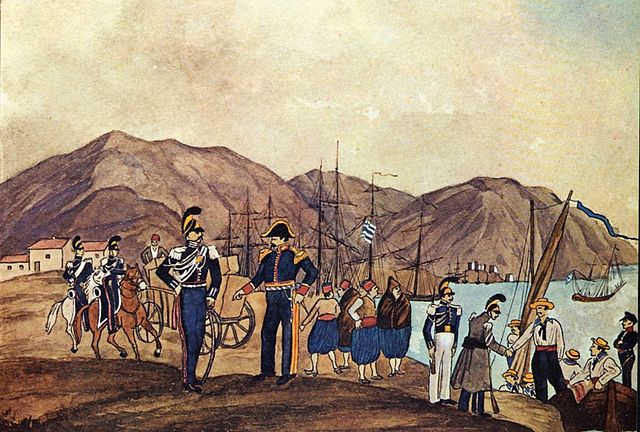Regency council of Otto of Greece
A regency council ruled the Kingdom of Greece in 1833–1835, during the minority of King Otto. The council was appointed by Otto's father, King Ludwig I of Bavaria, and comprised three men: Josef Ludwig von Armansperg, Georg Ludwig von Maurer, and Carl Wilhelm von Heideck. The first period of the regency saw major reforms in administration, including the establishment of an autocephalous Church of Greece. The regency's authoritarianism and distrust of the Greek political parties, especially the Russian Party, which was associated with the period of Governor Ioannis Kapodistrias and was particularly opposed to the Church reforms, led to a quick eroding of its popularity. Armansperg was the council's chairman, but increasingly clashed with the other two regents, who in turn aligned with the French Party under Ioannis Kolettis. The main domestic event of the early period was the arrest and sham trial of Theodoros Kolokotronis, a hero of the Greek War of Independence and the de facto leader of the Russian Party, in 1834. This rallied the opposition against the regency, helped provoke a major uprising in the Mani Peninsula, and fatally undermined the prestige of Maurer and Heideck versus Armansperg. The conflict was resolved in Armansperg's favour in July 1834, when Maurer was replaced by Egid von Kobell. Following Otto's coming of age in June 1835, the council was dissolved, but Armansperg remained in charge of the government as Prime Minister.

The Kingdom of Greece and the United States of the Ionian Islands after Greek independence
Arrival of Otto and his entourage at Nafplion, oil painting by Peter von Hess
First page of the first issue of the Government Gazette, with Otto's proclamation to the Greek people in Greek and German
Men of the newly established Royal Gendarmerie in Chalkis in 1835, watercolour by the Bavarian lieutenant Ludwig Köllnberger
Otto was a Bavarian prince who ruled as King of Greece from the establishment of the Kingdom of Greece on 27 May 1832, under the Convention of London, until he was deposed in October 1862.
Portrait by Joseph Karl Stieler, 1833
"The Entry of King Otto in Athens" by Peter von Hess, 1839
A portrait by Gottlieb Bodmer
Men of the Royal Gendarmerie Corps which was established after the enthronement of Otto in 1833







